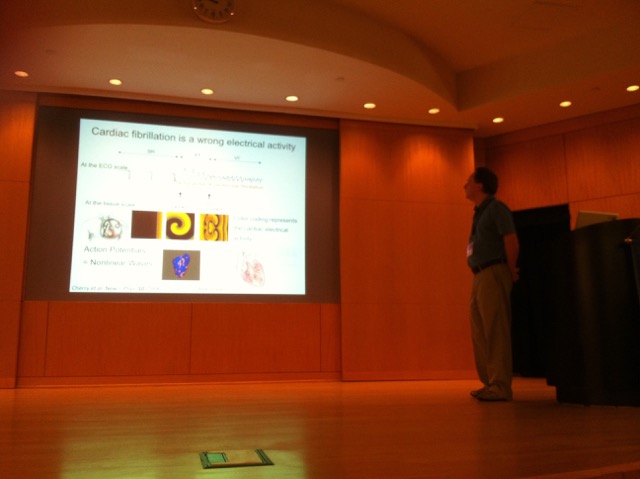The annual meeting of the Society for Mathematical Biology (SMB) was held in downtown Atlanta, GA from June 30th to July 3rd this year. Georgia State University hosted the interdisciplinary conference, which included 499 attendees from across the globe. Representatives from Georgia Tech, Emory University, Kennesaw State University, Georgia Regents University and University of Georgia assisted in the organization of the meeting. The theme of the conference was “Disease, Medicine, Public Health, and Systems Biology.” These topics were prominently featured with multiple panels devoted to specific topics such as modeling the recent Ebola outbreak, the spread and growth of cancer, cardiac dynamics, and neurodynamics. There were also many panels focused on applications of mathematical techniques and modeling to other biological disciplines such as ecology and evolution.
The day before the first talk a pre-meeting workshop on academic and non-academic careers was held. The workshop involved presentations and discussions on methods to navigate tenure reviews, write grants, and manage time. The set-up promoted a discourse between attendees and workshop leaders that led to straight talk on obtaining and maintain jobs both in and out of academia.
The conference format consisted of starting the days with plenary talks followed by seven parallel sessions grouped by topic and composed with 25-minute talks. One of the parallel sessions was typically organized around the theme of the conference, with a particular focus on the role of mathematical modeling in public health.

Jean Bragard (University of Navarra, Pamplona, Spain) speaks about the dynamics of cardiac fibrillation and defibrillation.
Additionally, there were multiple panels focused on pedagogy. In particular, many talks focused on how to develop a strong set of courses and curriculum at an undergraduate level related to mathematical biology. These talks were vastly popular often with standing-room-only attendance. It is clear that the mathematical biology community is treating the preparation of their future colleagues with utmost importance.
The conference also featured presentation of two awards: the Bellman prize and the Okubo Award. The Bellman prize is awarded to the top paper of the prior year. It was awarded to Piero Poletti (Bocconi University), and to Marco Ajelli and Stefano Merler (both Bruno Kessler Foundation) for their paper “Risk perception and effectiveness of uncoordinated behavioral responses in an emerging epidemic.” The strong connection between the theoretical work and empirical observation helped push this paper above other contenders. The Akira Okubo award is awarded to a living scientist recognized for his or her innovative contribution broadly in the field of mathematical biology. This award was accepted by Joshua Plotkin (University of Pennsylvania) who proceeded to give a thought-provoking talk that outlined his work related to inferring epistatic relationships in genes from the phylogenetic tree of influenza.
Overall, this conference featured a little something for everyone. There were impressive plenary talks, such as Michael Savageau’s (UC Davis) formalization of the concept of the phenotype for biochemical reaction networks. There was a wide range of subjects for contributed talks spanning from a whole session devoted to “Health Economics Modeling” to the current SMB president Fred Adler’s (University of Utah) “Dead baby whales.”
The next North-American SMB conference will be held at the University of Utah in Salt Lake City in Summer 2017 and will probably feature less sweet tea.
Written by Bradford Taylor